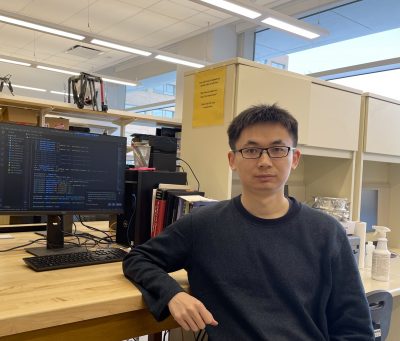Hongyi Xu, Assistant Professor, Mechanical Engineering
Story by Elizabeth Hannabach, Marketing and Social Media Intern, UConn IASE
 Dr. Hongyi Xu is an Assistant Professor with the Mechanical Engineering Department and is a researcher associated with the Institute for Advanced Systems Engineering at the University of Connecticut. Dr. Xu received his Ph.D. from Northwestern University and during his studies there he began his research in the design of microstructural materials. His specific focus at the time was on stochastic (random) structures and their formation. This pattern is now a part of his main research conducted here at UConn as well as deterministic (periodic) patterns and the flow between the two.
Dr. Hongyi Xu is an Assistant Professor with the Mechanical Engineering Department and is a researcher associated with the Institute for Advanced Systems Engineering at the University of Connecticut. Dr. Xu received his Ph.D. from Northwestern University and during his studies there he began his research in the design of microstructural materials. His specific focus at the time was on stochastic (random) structures and their formation. This pattern is now a part of his main research conducted here at UConn as well as deterministic (periodic) patterns and the flow between the two.
Once he graduated from his Ph.D. program, Dr. Xu joined the Ford Motor Company research center where he was tasked with working on several projects at a time, something he had not experienced in the academic world. He credits this experience for broadening his horizons as he is now able to understand the management of several different tasks for a wide variety of projects, and how to conduct them simultaneously. Through his job at Ford, Dr. Xu was also able to branch into 3D printing and the creation of deterministic structures.
With experience in both the natural forming (stochastic) structures and the more patterned, man-made (deterministic) structures, Dr. Xu was armed with the knowledge he needed to begin his research and to create his career proposal. The National Science Foundation funds what is called the Faculty Early Career Development Program (CAREER), which is a prestigious award provided to young professors who are not tenured and grants them funding for five years to pursue their research interests. Dr. Hongyi Xu is one of the recipients of this year’s award (2022) for his continued research on stochastic and deterministic structures.
In the past, these two types of structures seemed to be fairly independent. There were mathematical formulas derived to create each pattern, but no real overlap. This is where Dr. Xu and his research step in. He noticed how in the design process the material being created and used had to be determined before the work was conducted and that significantly limited the flexibility of the process itself. Seeing this, Dr. Xu began creating a program that would allow for engineers to enter a digital space and through programming create a digital model of a pattern that is on a spectrum between these random and periodic structures, thus making the material structural options virtually endless.
This research will lead to many great benefits. The combination of structures can lead to more effective designs for battery storage and capacity, it can generate materials for the frame of cars that are safer for drivers and passengers. The possibilities are endless especially now that more materials can be 3D printed, including things like biological materials for prosthetics. As more of his research is conducted, Dr. Xu will be able to determine the ideal structure for a wide array of materials and products and how to make them the most cost-effective.
Dr. Xu teaches an undergraduate course called the Introduction to Products and Processes where he discusses the design process and manufacturing of products. He also teaches a graduate-level course called Data Science for Materials and Manufacturing, which involves problem-solving with materials and manufacturing. The course provides a project-based learning experience where students learn to apply data mining and machine learning techniques to tackle challenges in materials selection and manufacturing system design and operation. Topics include the introduction to manufacturing processes, principles of design for manufacturing (DFM), design of experiments(DOE), data collection, data visualization, optimization, regression, supervised learning methods, unsupervised learning methods, ensemble modeling, applications of data analytics in manufacturing and computational materials engineering. (https://advancedsystems.engineering.uconn.edu/course-descriptions/)
When it comes to his teaching style, Dr. Xu works hard to shape his courses based on the perspective of the student. He is aware of how frustrating it can be when a person is learning something new, and the professor jumps right into complex and difficult applications because they are experts in that field. Knowing this, he works hard to ensure there is a strong foundation of basic principles and techniques before advancing into strenuous and intricate problems. He wants his students to be confident in their knowledge and master what he has taught them at the beginning of the course so that as he provides them with more challenging tasks, they can provide an effective solution in response.
Dr. Xu is a professor and researcher who cares about each of his student’s education goals and learning experiences. If a student takes a course with him, then they will be rewarded with unique and interesting information on his research, a strong academic foundation in the course materials, and be able to work up to solving real-world problems with confidence, regardless of difficulty. You can continue to follow his research here: https://me.engr.uconn.edu/blog/faculty/hongyi-xu/.